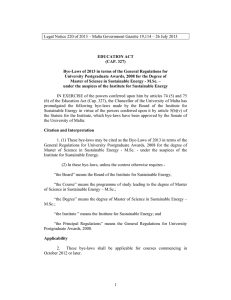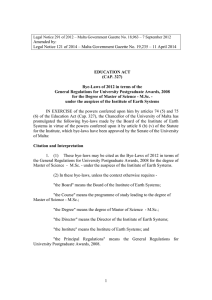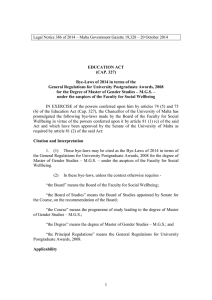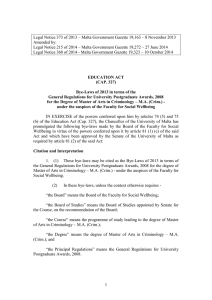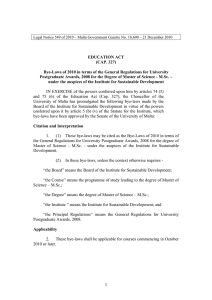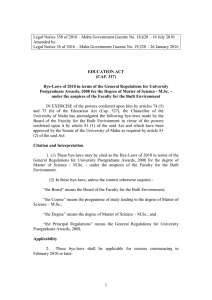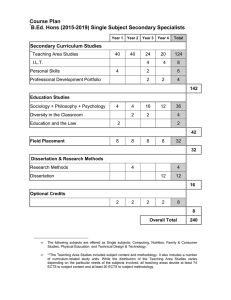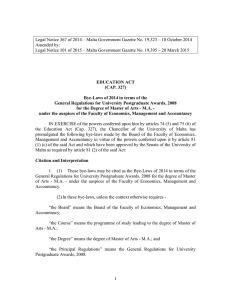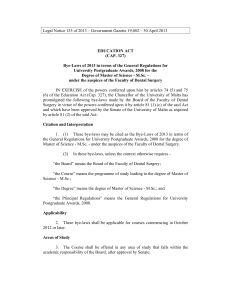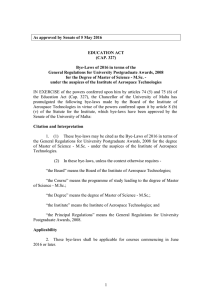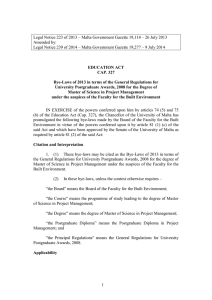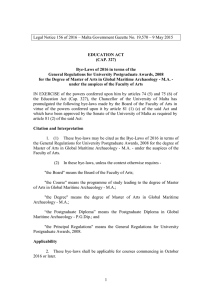(CAP. 327) Bye-Laws of 2015 in terms of the
advertisement
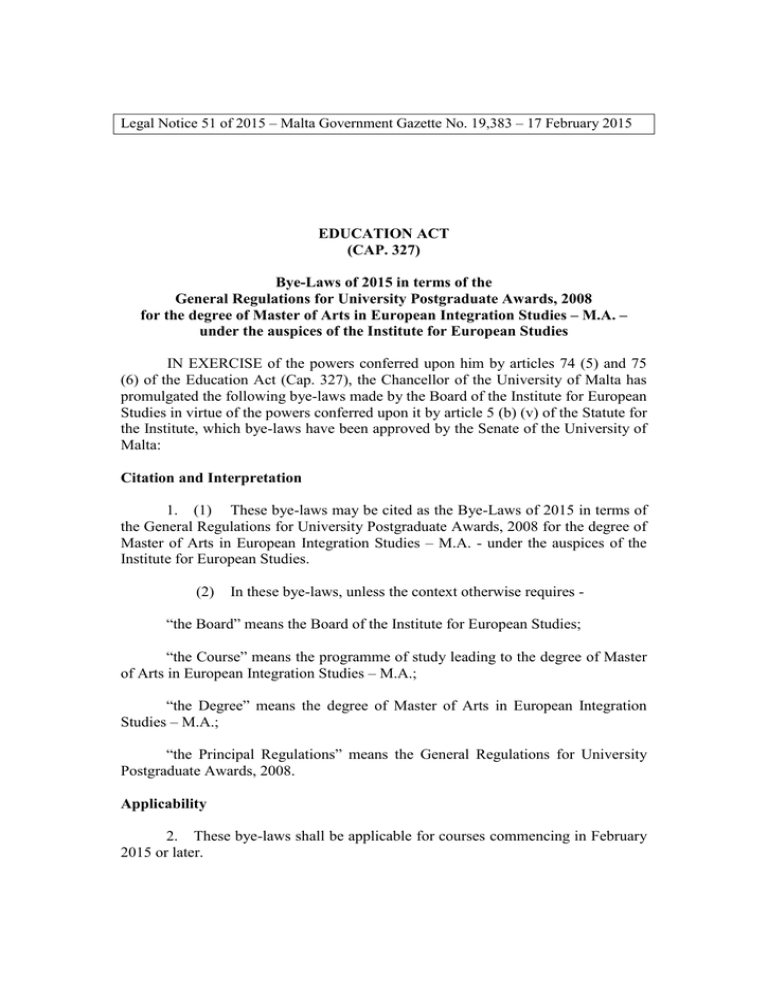
Legal Notice 51 of 2015 – Malta Government Gazette No. 19,383 – 17 February 2015 EDUCATION ACT (CAP. 327) Bye-Laws of 2015 in terms of the General Regulations for University Postgraduate Awards, 2008 for the degree of Master of Arts in European Integration Studies – M.A. – under the auspices of the Institute for European Studies IN EXERCISE of the powers conferred upon him by articles 74 (5) and 75 (6) of the Education Act (Cap. 327), the Chancellor of the University of Malta has promulgated the following bye-laws made by the Board of the Institute for European Studies in virtue of the powers conferred upon it by article 5 (b) (v) of the Statute for the Institute, which bye-laws have been approved by the Senate of the University of Malta: Citation and Interpretation 1. (1) These bye-laws may be cited as the Bye-Laws of 2015 in terms of the General Regulations for University Postgraduate Awards, 2008 for the degree of Master of Arts in European Integration Studies – M.A. - under the auspices of the Institute for European Studies. (2) In these bye-laws, unless the context otherwise requires - “the Board” means the Board of the Institute for European Studies; “the Course” means the programme of study leading to the degree of Master of Arts in European Integration Studies – M.A.; “the Degree” means the degree of Master of Arts in European Integration Studies – M.A.; “the Principal Regulations” means the General Regulations for University Postgraduate Awards, 2008. Applicability 2. These bye-laws shall be applicable for courses commencing in February 2015 or later. Requirements for Admission 3. (1) The Course shall be open to applicants in possession of a Bachelor degree obtained with at least Second Class Honours or Category II in European Studies. (2) The Board may allow applicants possessing a degree other than that specified in paragraph (1) of this bye-law to join the Course, provided that the degree classification is not less than Second Class Honours or Category II, and subject to the submission of a letter of motivation and an interview to establish whether such applicants have sufficient proficiency and background to enable them to follow the Course with profit. In such instances, the Board may recommend that applicants follow a preparatory programme as detailed in bye-law 4 of these byelaws. (3) All applicants shall be required to submit with their application a detailed synopsis of their research topic. Applicants shall be interviewed by an interviewing board appointed for the purpose of evaluating the research proposal, which must satisfy the Institute’s criteria. (4) The interviewing board appointed by the Board shall be composed of at least three members. It shall be chaired by the Director or his/her delegate. (5) When the number of places is limited and the number of eligible applicants exceeds the number of places available, applicants shall be selected using the following criteria, the weighting of which shall be published at the time of the call for applications: (a) degree type and class; (b) experience in the area of the proposed study; and (c) performance during the interview, referred to in paragraph (3) of this bye-law. (6) For the purpose of selection, applicants whose qualifications, as stipulated in paragraphs (1) and (2) of this bye-law were obtained by 31 August preceding the commencement of the Course shall be considered first. Preparatory Programme 4. (1) Applicants admitted under paragraph (2) of bye-law 3 may be required to complete a preparatory programme, comprising not less than 30 ECTS credits and not more than 60 ECTS credits, and to obtain an overall average mark of 55% or better, prior to their registration as regular students on the Course. (2) The Board may grant students full or partial exemption from the requirement of the preparatory programme if it is satisfied that the students possess post-first cycle qualification work experience that is relevant to Course. Course Duration 5. The Course shall extend over three semesters of full-time study or the equivalent in part-time study. Programme of Study 6. The Course shall comprise study-units to which a total of 90 ECTS credits shall be assigned, of which 10 ECTS credits are assigned to taught studyunits and 80 ECTS credits are assigned to the dissertation study-unit. 7. The programme of study shall be published by the Board after approval by Senate, normally not less than eight months prior to the commencement of the Course. Assessment and Progress 8. (1) The assessment of each taught study-unit shall be completed by the end of the semester in which the teaching of the study-unit is held. (2) Students who fail the assessment of the taught study-units shall be given the opportunity to re-sit the failed study-units during the September supplementary examination session. (3) Students who after re-assessment fail to obtain credit for any study-unit shall be required to withdraw from the Course. Dissertation 9. (1) Students shall be required to submit an individual dissertation of between 45,000 and 50,000 words (including references and footnotes) in accordance with specific guidelines approved by the Board. (2) Work on the dissertation may be undertaken at any time during the Course after approval of the research proposal. Each student shall be assigned a supervisor by the Board who shall provide guidance and advice on a regular basis during the period of study. (3) A provisional title for the dissertation and a detailed research proposal shall be submitted to the Board for approval concurrently with the application. The research proposal must be endorsed by a member of the academic staff of the Institute who has guided the student in its preparation. 10. (1) The Board shall appoint a Panel of Supervision for each student, normally composed of three members as follows: the Director of the Institute, or his/her delegate as Chairman, and two other members, one of whom being the principal supervisor, provided that when the Director of the Institute is the supervisor, s/he shall not chair the panel. (2) The Panel of Supervision shall follow, as it deems fit, the progress of students throughout the Course, provided that it meets at least twice a year to review such progress. (3) Students shall be required to report to their supervisors at least once every two months, and in addition as often as the supervisor deems necessary. (4) At the end of each semester of study, supervisors shall be required to submit to the Panel of Supervision reports on the students under their supervision. Students shall seek approval from said Panel for any substantial modification in the title or content of the dissertation. (5) The Panels of Supervision shall periodically inform the Board, in writing, on the general performance of each student. Such reports may include a recommendation to either (a) extend the period of study in order to enable the student to complete the dissertation; or (b) terminate studies prematurely if the supervisor deems this to be proper in the circumstances, provided that: (i) the extension of the study period referred to in (a) shall be in accordance with the provisions of the Principal Regulations; and (ii) the Board may not terminate studies prematurely according to (b) until it has first given the student a chance to be heard. Classification of the Award 11. The Final Weighted Average Mark for the purpose of the classification of the Degree shall be based on the results obtained in all the components of the programme of study, all credits being weighted equally. Special Provisions for Part-Time Courses 12. The provisions of the foregoing bye-laws shall apply mutatis mutandis to courses followed on part-time basis, and subject to such changes as may reasonably be deemed by the Board as necessary due to the part-time nature of the Course.
